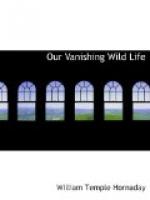To thoughtful Americans I particularly commend this list as a showing of the work of men who have not waited until the game had been practically exterminated before creating sanctuaries in which to preserve it. In view of these results, how trivial and small of soul seems the mercenary efforts of the organized wool-growers of Montana to thwart our plan to secure a paltry fifteen square miles of grass lands for the rugged and arid Snow Creek Antelope Preserve that is intended to help save a valuable species from quick extermination.
At this point I must quote the views of a high authority on the status of wild life and game preserves in Africa. The following is from Major Stevenson-Hamilton’s book.
“It is a remarkable phenomenon in human affairs how seldom the experience of others seems to turn the scale of action. There are, I take it, very few farmers, in the Cape Colony, the Orange Free State, or the Transvaal, who would not be glad to see an adequate supply of game upon their land. Indeed, the writer is constantly dealing with applications as to the possibility of reintroducing various species from the game reserves to private farms, and only the question of expense and the difficulty of transport have, up to the present, prevented this being done on a considerable scale. When, therefore, the relatively small populations of such protectorates as are still well stocked with game are heard airily discussing the advisability of getting rid of it as quickly as possible, one realizes how often vain are the teachings of history, and how well-nigh hopeless it is to quote the result of similar action elsewhere. It remains only to trust that things may be seen in truer perspective ere it is too late, and that those in whose temporary charge it is may not cast recklessly away one of nature’s most splendid assets, one, moreover, which once lightly discarded, can never by any possibility, be regained.
[Illustration: THE MOST IMPORTANT GAME PRESERVES OF AFRICA The Numbers Refer to Corresponding Numbers in the Text]
“It is idle to say that the advance of civilization must necessarily mean the total disappearance of all wild animals. This is one of those glib fallacies which flows only too readily from unthinking lips. Civilization in its full sense—not the advent of a few scattered pioneers—of course, implies their restriction, especially as regards purely grass-feeding species, within certain definite bounds, both as regards numbers and sanctuaries. But this is a very different thing from wholesale destruction, that a few more or less deserving individuals may receive some small pecuniary benefit, or gratify their taste for slaughter to the detriment of everyone else who may come after. The fauna of an empire is the property of that empire as a whole, and not of the small portion of it where the animals may happen to exist; and while full justice and encouragement must be given to the farmer and pioneer, neither should be permitted to entirely demolish for his own advantage resources which, strictly speaking, are not his own.”—("Animal Life in Africa.” p. 24.)




